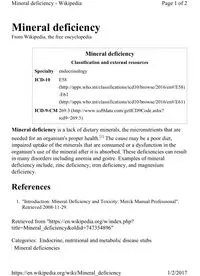
Mineral Deficiency-2017 PDF
Preview Mineral Deficiency-2017
Mineral deficiency Classification and external resources Specialty endocrinology ICD-10 E58 (http://apps.who.int/classifications/icd10/browse/2016/en#/E58) -E61 (http://apps.who.int/classifications/icd10/browse/2016/en#/E61) ICD-9-CM 269.3 (http://www.icd9data.com/getICD9Code.ashx? icd9=269.3) Mineral deficiency From Wikipedia, the free encyclopedia Mineral deficiency is a lack of dietary minerals, the micronutrients that are needed for an organism's proper health.[1] The cause may be a poor diet, impaired uptake of the minerals that are consumed or a dysfunction in the organism's use of the mineral after it is absorbed. These deficiencies can result in many disorders including anemia and goitre. Examples of mineral deficiency include, zinc deficiency, iron deficiency, and magnesium deficiency. References 1. "Introduction: Mineral Deficiency and Toxicity: Merck Manual Professional". Retrieved 2008-11-29. Retrieved from "https://en.wikipedia.org/w/index.php? title=Mineral_deficiency&oldid=747354896" Categories: Endocrine, nutritional and metabolic disease stubs Mineral deficiencies Page 1 of 2 Mineral deficiency - Wikipedia 1/2/2017 https://en.wikipedia.org/wiki/Mineral_deficiency ◾ This page was last modified on 1 November 2016, at 22:12. ◾ Text is available under the Creative Commons Attribution-ShareAlike License; additional terms may apply. By using this site, you agree to the Terms of Use and Privacy Policy. Wikipedia® is a registered trademark of the Wikimedia Foundation, Inc., a non-profit organization. Page 2 of 2 Mineral deficiency - Wikipedia 1/2/2017 https://en.wikipedia.org/wiki/Mineral_deficiency
